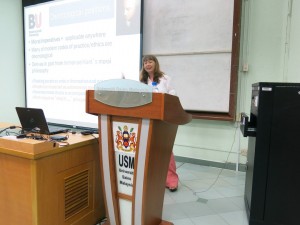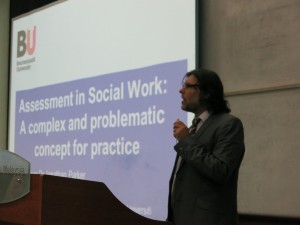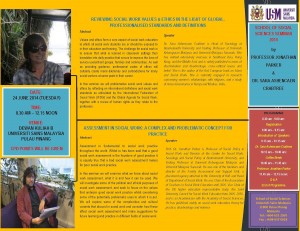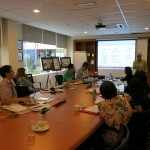

 We were extremely fortunate and, indeed, honoured to be invited to give public research seminars at Universiti Sains Malaysia, a premier (Apex) research university in Southeast Asia where we are currently visiting professors on Fusion funded study leave. The event was widely publicised and attended by students, faculty and numerous representatives from social welfare NGOs working in and around Penang. Many of the latter have provided our past students with placement experiences in the past, and in respect of whom we have researched student learning and experiences through our earlier British Council PMI 2 grant.
We were extremely fortunate and, indeed, honoured to be invited to give public research seminars at Universiti Sains Malaysia, a premier (Apex) research university in Southeast Asia where we are currently visiting professors on Fusion funded study leave. The event was widely publicised and attended by students, faculty and numerous representatives from social welfare NGOs working in and around Penang. Many of the latter have provided our past students with placement experiences in the past, and in respect of whom we have researched student learning and experiences through our earlier British Council PMI 2 grant.
We gave two seminars taken from our research and academic passions of great import to these services and to fostering good educational experiences and practices across the university and the NGOs with which they work; notably social work ethics and global issues and assessment problematics.
The first seminar, entitled ‘Reviewing Social Work Values & Ethics in the light of global, professionalised standards and definitions’ explored values and ethics as a core aspect of social work education to which all social work students are or should be exposed to in their education and training. Dr Ashencaen Crabtree argued that the challenge for social work is to ensure that what is learned in classroom settings then translates into daily practice and serves to improve the lives of service users/client groups, families and communities. She explored some of the unspoken assumptions that abound in this area stating that as well as providing guidance, professional codes of ethics create moral dilemmas and contradictions for many social workers at some point in their career wherever they practice and with whatever client or service group.
To illustrate points several case examples were used, some taken from Dr Ashencaen Crabtree’s previous research into social work practice in Malaysia and the United Arab Emirates. The seminar sought to problematise social work values and ethics by reflecting on international definitions and social work standards as articulated by the International Federation of Social Work (IFSW) and the Global Agenda for Social Work, together with a review of human rights as they relate to the profession.
This well-received seminar in which values and ethics were likened to the ‘mother’ of good social work practice, led into the second in which assessment was considered the ‘father’: ‘Assessment in Social Work: A complex and problematic concept for practice’.
Prof Parker opined that assessment is fundamental to social work practice throughout the world, drawing from his latest book: Parker & Bradley, Social Work Practice, 4th ed., Sage. Whilst it has been said that a good social work assessment is the keystone of good practice, however, it is equally true that a bad social work assessment makes for poor social work practice. However, whilst it is assumed we know what assessment entails and how it might or ought to be conducted, the seminar illuminated many of the hidden and unquestioned assumptions that often lead or underpin practice.
This seminar examined what we know already from research about social work assessment, what it is and how it can be used across the world and in different settings. We investigated some of the political and ethical purposes of social work assessment, focusing on the values that underpin good social work practice whilst considering some of the potentially problematic uses to which it is put. The seminar explored some of the complexities and cultural variants that abound in social work. It considered how these affect social work assessment and made suggestions for future learning and practice in different fields of social work, introducing the model the speakers have developed and researched comparatively across countries.
Prof Jonathan Parker & Dr Sara Ashencaen Crabtree
 ENABLE-ing Social Work Education: Sharing UK experiences and insights with our Malaysian colleagues
ENABLE-ing Social Work Education: Sharing UK experiences and insights with our Malaysian colleagues










 New CMWH paper on maternity care
New CMWH paper on maternity care From Sustainable Research to Sustainable Research Lives: Reflections from the SPROUT Network Event
From Sustainable Research to Sustainable Research Lives: Reflections from the SPROUT Network Event REF Code of Practice consultation is open!
REF Code of Practice consultation is open! ECR Funding Open Call: Research Culture & Community Grant – Apply now
ECR Funding Open Call: Research Culture & Community Grant – Apply now ECR Funding Open Call: Research Culture & Community Grant – Application Deadline Friday 12 December
ECR Funding Open Call: Research Culture & Community Grant – Application Deadline Friday 12 December MSCA Postdoctoral Fellowships 2025 Call
MSCA Postdoctoral Fellowships 2025 Call ERC Advanced Grant 2025 Webinar
ERC Advanced Grant 2025 Webinar Update on UKRO services
Update on UKRO services European research project exploring use of ‘virtual twins’ to better manage metabolic associated fatty liver disease
European research project exploring use of ‘virtual twins’ to better manage metabolic associated fatty liver disease